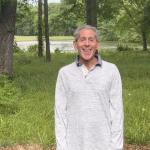
May is Mental Health Awareness Month

Dr. Scott Greenapple
May is Mental Health Awareness Month, and April is Stress Awareness Month.
So, we will combine a few theories, thoughts, and “tools” with helping people become aware and educated and offer some guidance for you or any you may know who suffers from these diseases.
Globally, mental health issues are on the rise. From COVID, political unrest, the war in Ukraine, climate change, inflation, and government involvement in woman’s rights, there is a sense of angst with so much uncertainty and division among us. With that being said, I am not sure if I have ever witnessed in my lifetime more depression, anxiety, and general anxiety disorder (GAD) being reported in the media or seen in health care professional practices.
Some experts have theorized that we have between 60,000 and 70,000 thoughts per day, and 90% of them we thought of yesterday. So, in essence, we continue to play this loop of thoughts over and over in our minds. And, we tend to have what is known as the “negativity bias” in our brains that leads to a reactionary fear and anxiety thought process that can become habituated patterns in our minds. This leads to our emotions getting hijacked, which can distract from a good sense of responsibility to a poor emotional reaction and poor choices.
We can take small positive actions daily, which hopefully, in time, lead to more significant and perhaps more permanent changes over the long run. The brain is just one part of the human biological system and has been a bit oversimplified about how our mental health is regulated. There are connections from the gut and the heart to the brain and nervous system that directly affect our psychological and neurological well-being and homeostasis.
One thing we can start with is changing our language to what is known as non-identification.
This means not “attaching” yourself to the disease, limiting the pronoun of “my.” Instead of saying, “my anxiety is bad today, or my depression is bad today,” try to say, “I am having an anxious day or depressive thoughts.” This may sound trivial to you, but with non-attachment, you do not identify with the disorder. It does not define you; you only experience its symptoms—minor changes for a possible more significant long-term change. Like clouds passing by, we do not attach to the clouds; we watch them pass without getting stuck. We want to be the sky, the universe, and just witness, become present and aware as the clouds or thoughts pass by us.
There are many neurotransmitters and neuro-hormones that have direct effects on our brain chemistry. Many pharmaceuticals address these things and are often prescribed for depression and anxiety. For instance, Selective serotonin reuptake inhibitors (SSRI) are common ones. It is now understood and estimated that 75% or more serotonin is produced in the gut. So, we need to look at the human system when addressing these issues. Things like foods we ingest can have an effect both positively and negatively on our minds and brain activity.
The Vagus nerve is the longest in the body. It means wandering nerves. The vagus nerve is the 10th nerve of the 12 cranial nerves. It has numerous functions. It is responsible for the nerve supply to all the body organs. It also governs the parasympathetic part of the autonomic nervous system. The two parts of the system are the parasympathetic (rest, digest, and restore) and the sympathetic (flight or fight). These two parts should be in a relative homeostasis pattern of balance. When we are stressed or have depression or anxiety, we tend to be more stuck in sympathetic responses. Ways to increase our vagal tone or increase our Vagus nerve response are things like diaphragmatic breathing or what is known as belly breathing. When inhaling, see if you can inhale from the belly. The belly goes out on the inhale and in on the exhale. As it passes through the neck, one of the first branches of the Vagus nerve is the laryngeal branch. So, things like humming, singing loudly, chanting, and gargling can stimulate the Vagus nerve and are easy to incorporate into your self-care.
The brain is malleable, and it can change. We can change some of our habituated and behavioral patterns. We can re-wire our brains through what is known as positive neuroplasticity. What we practice grows stronger.
Here are a few simple ways to improve our mental health:
- Meditation: pause, slow down, and just become aware. You do not have to engage in formal meditation techniques. A few short pauses through the day with some deep breaths will do.
- Sleep: We do not heal unless we sleep. When sleeping, we are in a higher level of parasympathetic activity.
- Eating healthy: Food is medicine or can be a form of toxicity.
- Staying active: Exercise and things like movement meditation like Qi Gong Gratitude: Having gratitude helps us see the good and positive in life.
- Finding meaning and purpose: When we have purpose, rituals, and goals, this provides a sense of well-being and accomplishment.
With all that being said, we are not naïve enough to believe that all mental health issues can be taken care of with these techniques. These are just a few tools to add to the toolbox for help. Mental health is a disease and, like any disease, often needs a multi-pronged approach. If you are experiencing signs of depression or anxiety, please reach out to a medical professional, a therapist, friends, or family to talk to and be heard.
It has been said that depression is not a character flaw; depression is a flaw in chemistry.



